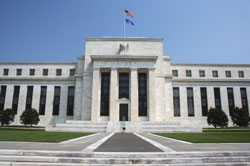 |
 |
 |
 |
Merchant Account TypesMerchant Account ProvidersNews & AdviceMerchant Account Tools |
 Print Print  Email Email Fed pivots on interchange feesMerchants received some bad news Wednesday after the Federal Reserve decided to reverse course on debit card interchange fees and set the maximum transaction fee at 21 cents per transaction, rather than 11. 
Before Wednesday, interchange fees on debit card transactions were expected to be curbed at a much steeper rate under a provision in the Dodd-Frank Wall Street Reform and Consumer Protection Act that was signed into law in 2010. Under that provision -- known as the Durbin Amendment (after Illinois Sen. Richard Durbin, who sponsored the interchange fee legislation) -- financial institutions with assets over $10 billion are required to seriously slice fee amounts related to debit card transactions. In response to the amendment, the Federal Reserve recommended last December that the fees on merchant debit card transactions be cut from approximately 44 cents per transaction to 12 cents -- a big reduction -- and a welcome one to U.S. merchants. But fast forward six months to June 29, 2011 when the Federal Reserve decided to reverse course and peg the final debit card interchange fee at 21 cents per transaction instead. That's certainly lower than the original 44 cents merchants were being charged, but it's also almost double the amount that retailers thought they were getting after the December announcement by the Fed. Throw in a few cents more to banks that provide government-approved fraud-fighting programs, and to accommodate a few other Federal Reserve standards, and the total fee that big financial institutions could receive tops out at 24 cents per transaction, exactly double the amount promised back in late 2010. Here's how the Federal Reserve describes the fee change: "When combined with the maximum permissible interchange fee under the interchange fee standards, a covered issuer eligible for the fraud-prevention adjustment could receive an interchange fee of up to approximately 24 cents for the average debit card transaction, which is valued at $38," said the Fed in a statement. But that's not what the Federal Reserve said last December. Here's what the Fed said in a statement dated December 16, 2010, touting the lower merchant debit fee figure: "The Board is requesting comment on two alternative interchange fee standards that would apply to all covered issuers: one based on each issuer's costs, with a safe harbor (initially set at 7 cents per transaction) and a cap (initially set at 12 cents per transaction); and the other a stand-alone cap (initially set at 12 cents per transaction). If the Board adopts either of these proposed standards in the final rule, the maximum allowable interchange fee received by covered issuers for debit card transactions would be more than 70 percent lower than the 2009 average, once the new rule takes effect on July 21, 2011." Needless to say, merchant groups aren't happy about the Fed's apparent last minute reversal. The National Retail Federation expressed its frustration with federal policymakers over the fee hike decision in a statement released the same day. "American consumers suffered a major loss today," said NRF President and CEO Matthew Shay in a statement. "We are extremely disappointed that the Federal Reserve chose to be influenced by special interests and ignored the will of Congress and American consumers. While the rate will provide modest relief, it does not go far enough." The NRF's lawyer took the criticism one step further, calling the decision "unacceptable to Main Street merchants." The new fee caps are set to take place on October 1, 2011. See related: Fighting high card processing fees with store debit cards; Credit card rules for merchants 'anticompetitive,' says Justice Department. Published: July 5,2025Comments or Questions, Library of Stories
|
|||||||||||||